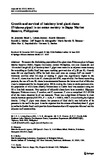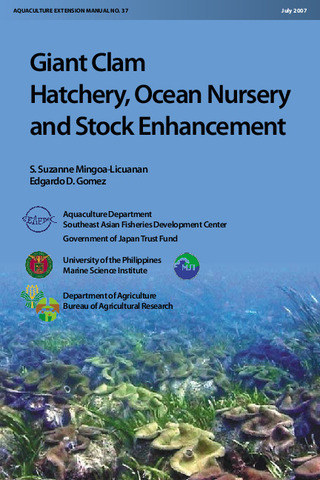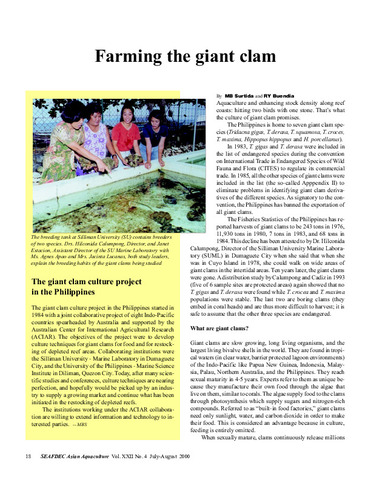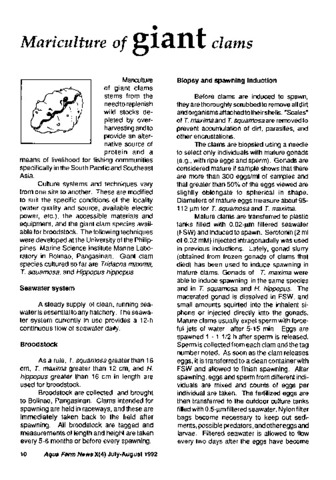Growth and survival of hatchery-bred giant clams (Tridacna gigas) in an ocean nursery in Sagay Marine Reserve, Philippines

Tingnan/
Request this document
Petsa
2010May-akda
Page views
374Metadata
Ipakita ang buong tala ng itemCited times in Scopus
Share
Abstract
To restore the diminishing population of the giant clam Tridacna gigas in Sagay Marine Reserve (SMR), Negros Occidental, central Philippines, two size classes [8- and 10-cm shell length (SL)] of hatchery-bred T. gigas were reared in an adjacent ocean nursery for restocking to Carbin Reef later upon reaching grow-out size of ≥20 cm SL. Growth rates did not significantly differ for both sizes and were on average 0.67 cm month−1. However, survival after 382 days of rearing T. gigas was significantly higher in the 10-cm SL clams than the 8-cm SL clams (96 and 83%, respectively). For future restocking projects, the use of 8-cm SL clams is recommended because the lower survival of this size class is compensated by its cheaper price. While rearing the clams to attain grow-out size, the population of wild clams (Family Tridacnidae) in Carbin Reef was assessed using ten 50 × 2-m belt transects. Four species of tridacnid clams have been recorded: Hippopus hippopus, Tridacna crocea, T. maxima>, and T. squamosa. T. crocea comprised 12.5–93.9% of all the clams observed in all ten transects. There was a significant difference in clam density between species (ANOVA, F = 6.94, P < 0.001), with T. crocea having the highest density. Living T. gigas were absent, but presence of dead shells was indicative of its presence in the reef in the past. It can be expected that the release of hatchery-bred T. gigas juveniles in Carbin Reef could provide future breeders that will repopulate this reef and the adjacent reef communities.
Suggested Citation
Lebata-Ramos, M. Junemie Hazel L., Okuzawa, K., Maliao, R. J., Abrogueña, J. B. R., Dimzon, M. D. N., Doyola-Solis, E. F. C., & Dacles, T. U. (2010). Growth and survival of hatchery-bred giant clams (Tridacna gigas) in an ocean nursery in Sagay Marine Reserve, Philippines. Aquaculture International , 18(1), 19-33. https://doi.org/10.1007/s10499-009-9272-4
Paksa
clam culture  ; growth rate
; growth rate  ; hatcheries; mariculture; marine parks
; hatcheries; mariculture; marine parks  ; nursery grounds
; nursery grounds  ; Oceans
; Oceans  ; population density
; population density  ; reefs
; reefs  ; restocking
; restocking  ; shells
; shells  ; stocking (organisms)
; stocking (organisms)  ; survival
; survival  ; Hippopus hippopus
; Hippopus hippopus  ; Tridacna crocea
; Tridacna crocea  ; Tridacna gigas
; Tridacna gigas  ; Tridacnidae
; Tridacnidae  ; Philippines
; Philippines  ; Philippines, Negros I., Negros Occidental; assessment
; Philippines, Negros I., Negros Occidental; assessment  ; Giant clam; Ocean nursery
; Giant clam; Ocean nursery
 ; growth rate
; growth rate  ; hatcheries; mariculture; marine parks
; hatcheries; mariculture; marine parks  ; nursery grounds
; nursery grounds  ; Oceans
; Oceans  ; population density
; population density  ; reefs
; reefs  ; restocking
; restocking  ; shells
; shells  ; stocking (organisms)
; stocking (organisms)  ; survival
; survival  ; Hippopus hippopus
; Hippopus hippopus  ; Tridacna crocea
; Tridacna crocea  ; Tridacna gigas
; Tridacna gigas  ; Tridacnidae
; Tridacnidae  ; Philippines
; Philippines  ; Philippines, Negros I., Negros Occidental; assessment
; Philippines, Negros I., Negros Occidental; assessment  ; Giant clam; Ocean nursery
; Giant clam; Ocean nursery
Mga koleksyon
- AQD Journal Articles [1231]
Related items
Showing items related by title, author, creator and subject.
-
Giant clam hatchery, ocean nursery and stock enhancement
Mingoa-Licuanan, S. Suzanne; Gomez, Edgardo D. (Aquaculture Department, Southeast Asian Fisheries Development Center, 2007)This manual is meant to serve as a guide to the culture of giant clams (Bivalvia, Subfamily Tridacninae). The first part focuses on hatchery methods. The second part is about the ocean nursery. The first two sections refer ... -
Farming the giant clam
Surtida, Marilyn B.; Buendia, Romeo Y. (Aquaculture Department, Southeast Asian Fisheries Development Center, 2000) -
Mariculture of giant clams
Castaños, Milagros T.; Southeast Asian Fisheries Development Center, Aquaculture Department (Aquaculture Department, Southeast Asian Fisheries Development Center, 1992)



